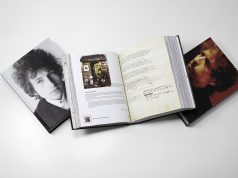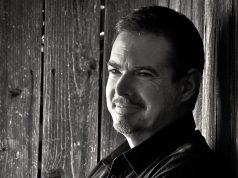
It´s every author’s dream to have her books optioned and turned into film. Author Charlaine Harris is living that dream. Her Sookie Stackhouse series, which reaches 11 books this week with the release of Dead Reckoning, is the basis for HBO’s hit series True Blood, which is so popular that its stars graced the cover of Rolling Stone wearing nothing but smears and dribbles of fake blood.
A best-selling book series. A hit cable TV series. It’s a writer’s dream — on V juice.
So who is Harris, the writer behind this quirky vision of the future, in which vampires — not to mention werewolves, shape-shifters and other “supes,” i.e., supernatural creatures — have “come out of the coffin” and are struggling to live alongside humans?
Harris grew up in the Mississippi River Delta area and, by her own admission, felt like an outsider. A voracious reader, she was already writing as a teenager, penning angsty poetry, then writing plays in college and moving on to novel-length fiction. She published her first book, a mystery novel titled Sweet and Deadly, in 1981. After publishing two stand-alone mysteries, she launched her award-winning Aurora Teagarden series, eight books set in the small town of Lawrenceton, Ga.
In 1996, Harris released the first book in her Shakespeare mysteries, which were set in another small town, this time Shakespeare, Ark. These books — there are five in all — were darker than her previous works and contain humor that would be very familiar to Sookie Stackhouse fans, mixing laugh-out-loud hilarity with dark violence, tragedy with absurdity.
When Harris started writing her first Sookie Stackhouse book, she helped break ground on a new sub-genre now called urban fantasy.
Featuring a telepathic waitress who lives in Bon Temps, La., and written in first person, the Sookie Stackhouse series seamlessly mixes sensuality, violence and humor as readers experience the people of small-town Louisiana through Sookie’s eyes. But beware — Bon Temps isn’t Mayberry.
The stories showcase Harris’ skill as a keen observer of human nature and carry a moral premise about tolerance that’s impossible to miss. We see the residents of Bon Temps, both supes and human, in all their bigoted, flawed and petty glory, their higher nature conflicting always with what is mean, stupid and selfish inside them.
Harris lets no one off the hook, whether they’re racists, gay-bashers or religious fundamentalists who hate vampires.
Through the character of Sookie, Harris seems to be sharing her own experience of feeling like an outsider and urging us all to accept the complicated truth about ourselves — and the truths about others, as well.
The series propelled Harris to the No. 1 spot on the New York Times bestseller list. Boulder Weekly caught up with Harris just as she was about to head off on a book tour in support of Dead Reckoning, including a signing on Wednesday, May 11, at 7 p.m., at the Tattered Cover Book Store in Denver.
Easygoing, warm and professional, she spent most of an hour answering our questions. (Read below to learn how you can win one of two copies of Dead Reckoning that Boulder Weekly is giving away!)
Boulder Weekly: The first Sookie Stackhouse book was published in 2001.
Charlaine Harris: That sounds right, because I’m working on the 12th one now. It was either 2000 or 2001. I wrote it two years before. It took two years for my agent to find a place for it.
BW: Urban fantasy wasn’t yet being published as a sub-genre, and paranormal romance hadn’t yet taken off.
CH: No urban fantasy then.
BW: As you were writing the first book, did you know it was a risky project? In addition to the paranormal/urban fantasy element, no one was really writing first-person back then.
CH: I did. It was very hard then. In fact, the only other person who was writing anything like it was Laurel K. Hamilton, because they couldn’t figure out where to put it on the bookshelf. They would say, well, it’s just not really a mystery, and I’d go, no, because that’s what I’d been writing. And it’s not really science fiction. It’s not really romance, so we just don’t know where to put it in the bookstore. And I said, “Well, you can put it in all three of those places and still be OK as far as
I’m concerned.” But that was a big issue then. Now, you know, urban fantasy sometimes has got its own section.
BW: How would you characterize the difference between urban fantasy and paranormal romance?
CH: Well, paranormal is usually followed by “romance,” so I think paranormal romance definitely has more emphasis on the romantic elements, obviously, and maybe a little less on the adventure, and urban fantasy is more about the adventure generally than about the romance.
BW: You create such a sense of place in your stories — a phrase here, an expression there. As I was reading Dead Reckoning, I came across the term ‘hair receiver,’ and I laughed out loud. I don’t even know what a hair receiver is, but just mentioning it added that touch of Mississippi Delta culture. So what’s a hair receiver?
CH: When women used to brush their hair, they would keep it in a hair receiver, which is like a china dish designated as a hair receiver, and I’m not really quite sure why. Sometimes they would use it later on to make jewelry and stuff like that. Yeah, I know, weird, but when I was trying to figure out what Sookie would’ve been looking at at the antique store, I looked up a lot of things, and I thought, “Oh, she would see a hair receiver, I’m sure.”
BW: One of the things that sets your books apart is the deft way you combine humor with the macabre.
CH: That’s the way I see life. I mean, there’s awful stuff, and then there are things you laugh at — and some-times it’s the same thing.
BW: Sookie’s stories are told from a first-person point of view, and it’s very clear that she feels like an outsider in her own world.
CH: I think it’s a little bit easier to write from the outsider’s point of view because they make more observations about the culture they live in than the people who are at the center of it.
BW: Did you feel like an outsider as a child?
CH: Oh, sure, you know, yes, I did, because there wasn’t anybody else like me when I grew up. There wasn’t anybody else who lived a lot of their lives inside their heads, people who were always thinking about how they observed other people, what they were learning from observing other people. And not that many people read as much as I did as a kid.
BW: Why do you think vampires are so big now? What’s behind the surge in paranormal romance and urban fantasy?
CH: Traditionally in depressed times people turn to fantasy literature, and I think that’s probably part of it. Also I think everyone just wants to believe there’s something else out there besides us.
BW: Some of the biggest fiction series right now involve a protagonist who starts out believing he or she is just another person — oftentimes an awkward outsider — only to discover that he or she is actually very special. Harry Potter discovers he’s a wizard. Bella from the Twilight series is somehow immune to vampire abilities. Sookie is also more than she seems. What’s behind this fantasy?
CH: I think it’s like a frequent childhood fantasy that you were adopted, that your real parents are a prince and princess or someone fabulously wealthy that will come sweep you up into a life of luxury and ease. I think that’s a pretty common childhood fantasy, especially with unhappy children.
Everyone wants to believe that there’s something about themselves that is rare and wonderful and hasn’t yet been discovered. I think in Sookie’s case she would rather not have the thing that makes her different, because it’s made her almost inevitably really unhappy. And actually it was the worst thing that I could think of to do to anybody.
And yet so many people say, “Oh, I wish I was telepathic. I think that would be wonderful.” I think that’s my worst nightmare — to know what people really think of me.
BW: Sookie has really suffered as a result of her telepathy.
CH: She has, but that’s the way I see it, as being a horrible thing. People deserve the privacy of their own thoughts, I think. All of us have ideas we’re not proud of. Unfortunately, Sookie has to listen to all that.
The only issue I have with romance — and it’s just a quibble because I do read romance — is that people tend to be all good or all bad. Or if the writer is trying to be realistic, their bad points are charming quirks. We’re all mixtures of all kinds of things, and some of them are charming, and some of them just aren’t.
BW: How do you stay inspired to write?
CH: That’s become increasingly hard with that series. My contract is up with the 13th book, so I think I will stop the series then. I feel like if I keep on pushing to get the story, rather than having it come to me naturally, that I’ll be doing Sookie a disservice.
You just think, “I’ve done everything with this character I can. I’ve said what I want to say. it’s time to move on.”
BW: Do you read while you’re writing, or do you worry that reading other authors’ work will imterfere with your voice?
CH: When I first started out as a writer, I felt that way. It was very hard for me to read certain writers while I was working. I just couldn’t do it. Now, after being a writer for more than 31 years, I really don’t have that problem anymore. I’ve pretty much got my own voice fixed. So I can read anything I want to, which is wonderful, because I just love to read.
I don’t know what people do if they don’t read, really.
I just couldn’t think of anything more wonderful to be [than a writer].
BW: Being a writer is a calling.
CH: I agree.
BW: Do you watch True Blood?
CH: I do. They are nice enough to send me — almost always — an early screener, so I get to see it before it’s on TV.
BW: Lucky you! Do you find it strange to see characters that came from your head on the television screen being developed in ways that didn’t come from you?
CH: At first it was, but I think I’m used to it now. It seems like every season — we did just finish the third season — it seems like with every season the two paths diverge a little more, so it’s really not like watching my story so much.
And that’s OK. I knew that was going to happen. Alan [Ball, who created True Blood based on Harris’ books] discussed that with me before he even started filming, and actually I’m content with that, because if they were just filming the books, that would be boring for me. This way, I don’t really know what’s going to happen, and I find it quite exciting.
BW: I asked for questions from Sookie Stackhouse fans on Facebook and Twitter, and this question comes from LisaRenee1234: “Has the HBO series made it harder for you to write these books?”
CH: Not really. At first I was scared there was going to be a conflict, but I’m so far ahead in the story that it really hasn’t turned out to be a problem. They’re filming book four, and I’m writing book 12.
BW: There are some significant differences between the series and the books. For one, Lafayette dies early in the series, but HBO and fans loved Nelsan Ellis’ performance, and so he’s alive in True Blood. I’m really happy about that, because I adore his character.
CH: Me too. Nelsan is just great.
He is really fabulous, and he owes his survival to his talent.
BW: Do you think it’s easier for people to read the books and then watch the series or watch the series and then read the books? Either way, they develop expectations.
CH: I don’t know, because I’ve never been in the position of just watching the series and then trying to read the books. I did get a lot of readers from the series, and I like to think the series got a lot of watchers from the book. So I think from that point of view it’s been a very successful cross pollination. And there are people who would never read the books anyway, and likewise some of my readers just don’t watch television, so I think it’s been as good a cross-pollination as we could get.
BW: The message of the books seems to be, “Be yourself, and be tolerant of others,” with the vampire community’s struggle for acceptance seeming to parallel the civil rights and gay rights movements. In fact, both the books and the HBO series have a strong gay theme. Was that intentional?
CH: Sure. I mean, I’d have to pretty dumb not to realize what I was writing. That was a conscious decision.
BW: Do you ever catch flak for that?
CH: No. I don’t. Amazingly. I mean I’m sure there are people who don’t like that, but they’ve never said anything to me. On the contrary. I’ve gotten a couple of awards from the gay community, which I’m super proud of. I got the Straight for Equality literature award from PFLAG. I was really proud of that.
BW: It has always seemed to me that Gran, Sookie’s grandmother embodies that message of tolerance. Is she based on someone in your life?
CH: Not my grandmother, that’s for sure. She’s really a bit like my mother, but idealized, I guess. She was the grandmother Sookie had to have to grow up stable, so that’s why Gran is the way she is. therwise Sookie would just be so screwed up. She had to have a Gran to bring her up.
BW: I can imagine it would be hard to let go of a series and characters who’ve been a part of your life for so long. Do you have projects in mind for after that 13th book is written?
CH: I have so many options I can’t even choose. I love Sookie, and I’ve loved writing about her. I sure got restless, and the business of being the person writing Sookie just got so overwhelming, doing so many personal appearances, doing so many interviews — which is a privilege and a joy, but also takes time away from my work. It’s work in its own way, but not the work that I feel like I was put here to do. IÂ Â will be really glad to get back to more writing time. I know I’m very, very fortunate, and I’m always conscious of that, but at the same time I do enjoy just doing the work.
BW: Dead Reckoning, the 11th book in the series, was just released this week. In this book, Sookie witnesses the firebombing of Merlotte’s. While everyone’s trying to figure out whether it’s anti-shifters trying to drive Sam away, Sookie gets caught up in her vampire lover Eric’s plot to kill his master. Any thoughts about the book?
CH: I certainly hope people enjoy it as much as they’ve enjoyed the past Sookie books. And I’m looking forward to meeting a lot of readers [on tour], and I hope they’re happy with it. When I’m touring, inevitably, closer to the end of the tour, I’m talking to lots of people who have already read the book, and then the audience gets a little difficult to judge, because about 70 percent of them will not have read the book, as opposed to the people who have already read it and want to ask questions. I have to be very careful then, because you don’t want to blow it for somebody else. That’s never any fun.
To win a copy of Dead Reckoning (we have two!), register and comment on this story. Or sign up to receive our weekly newsletter, the Boulder Weekly Insider.
Respond: [email protected]














